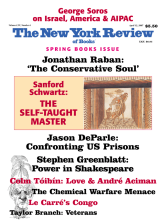In response to:
Return of the Master from the March 1, 2007 issue
To the Editors:
It’s fascinating that the one book that sheds the most light on Hardy’s psyche, The Mayor of Casterbridge, is not mentioned in Tim Parks’s review of Thomas Hardy by Claire Tomalin [“Return of the Master,” NYR, March 1].
I venture to assert that there is not a more profound, insightful description of depression anywhere else in literature. It could only have been written by one who had experienced such himself. While I am ignorant of the details of Hardy’s life he must have had a severe depression sometime or many times to have written such.
I recall the effect of reading the ending of Casterbridge many years ago as being so disturbing that I would not reread it now.
Depression, whatever its cause (genetic/ environment), explains much of the “mysteries” that Parks alludes to.
Stanley Marcus, M.D.
Encino, California
Tim Parks replies:
The Mayor of Casterbridge is indeed a powerful work, though the idea that only one of Hardy’s fourteen novels might help us to understand his mind is new to me. That the author suffered periods of depression is well documented, but so did many fine novelists whose overall vision comes across as far sunnier than his. Without wishing to do anything so destructive as to explain away the impulses behind his writing, I had hoped that the parallels I drew between his life and work would indicate a personality structured above all around the polarity fear/courage. On being asked why he endlessly conjured up the most negative consequences of any carefree act of physical love, Hardy replied that he hoped his stories might prevent certain disasters from happening.
In her biography Tomalin rightly points out that he could not have been so foolish as to imagine that young men and women would behave more judiciously as a result of his storytelling. She misses the point that the warning was meant for himself. Gloomily and relentlessly, Hardy imagined the doom that would follow acts of assertion, desire, and courage he had himself dreamed of but never acted on. For those eager to attach a psychopathology to their favorite artist, this would suggest the phobic rather than the depressive. Meantime Hardy lived into cautious and by no means unhappy old age beside a depressive wife and still found the energy to marry again when she was gone, taking great care to avoid scandal.
This Issue
April 12, 2007



